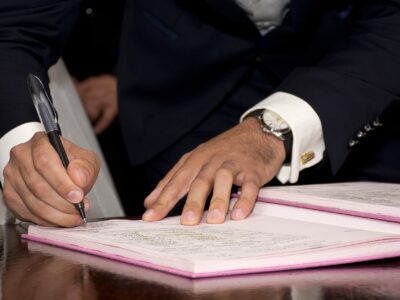DISCLAIMER
In case of interpretation or translation misleading, the Italian version will prevail.
DURATION
2 days
DATES
6-7 October 2025
TIME SCHEDULE
9,00 – 14,30
PARTICIPATION FEE
euro 500.00 + VAT (the fee is exempt from VAT if paid by public bodies)
RELATORS
Lawyer Francesca PETULLÀ
Administrative Lawyer in Rome co-founder and senior of the law firm of the same name and of the company Law Lab as well as of the PNRR ADVISORY NETWORK. Contract professor in various universities and public and private institutes
Ing. Francesco PORZIO
Consultant and lecturer on contracts, tender strategies, IT and telecommunications at Porzio & Partners
INTRODUCTION
The seminar will review the different ways in which public contracts are carried out and the procedures for selecting the contractor depending on the amounts and types of individual assignments, and will then move on to the phase of the stipulation of contracts and the definition of their contents, paying particular attention to the innovations introduced by Law 55/2019 and Law 120/2020.
PROGRAMME
The transitional law of Legislative Decree 36/2023 for the tendering and awarding phase.
The internal phase of public contract award procedures. Determination to contract and equivalent acts: prerequisites and motivations. Identification of the contents of the contract: works, supplies or services: mixed contracts.
The procedures for choosing the contractor. The new legal regime of sub-threshold procedures. The cross-border interest. The reservation of subcontracts to SMEs. Direct awards and invitations to tender. Lists of economic operators: characteristics, formation and methods of maintenance and management. Invitations to tenderers and the use of operators established in the contracting authority’s territory. Tender and jury commissions The anomaly of the tender. The standstill. Documentary verifications and the new legal regime of measures to be taken by the contracting station.
Tender procedures: description of open, restricted, negotiated; competitive procedure with negotiation, innovation partnership, competitive dialogue, dynamic purchasing system, electronic auctions, framework agreements; pre-commercial agreements.
The call for tender: mandatory clauses to be included in the call for tender between environmental protection, gender equality and social inclusion and contractual balance. The management of the tender by lots and the clauses for SMEs and workers. The future of national and EU publicity entrusted to ANAC. The new Tender Terms.
The access and qualification requirements of the operators: the causes of exclusions and the professional offence in the light of the Cartabia reform and the reform of the business crisis code. The exclusion procedure and self-cleaning in tenders.
The tools for supplementing the qualification of the economic operator: temporary association; outsourcing and communication obligations; subcontracting; specific regimes and areas of discretion of the contracting stations with particular reference to RTI and subcontracting; consortia of enterprises: different types and disciplines.
The supplementary and specific investigatory measure and related operational issues.
The award criteria: below the European thresholds, equivalence in the choice between the lowest price and the economically most advantageous offer.
Tender operations: tender committee and identification of commissioners. The discipline below the European thresholds and specific cases. Public and reserved sessions, and telematic management.
The discipline of abnormally low bids and cases in which automatic exclusion is required: the prerequisites and mechanisms for calculating the threshold according to the number of admitted competitors. The verification of abnormally low bids in the case law reconstruction.
The adjudication and communication obligations. Adjudication reports: criteria for their compilation, discretionary and mandatory clauses. Limits to the power not to award the contract. The standstill period. Transparency rules.
The Control of Requirements. The FVOE and the Casellario delle imprese: preparatory fulfilments (control of the substitutive declarations of certification and of the contents of the Single European Tender Document concerning the grounds for exclusion and the requirements for participation, acquisition of the final guarantee, anti-mafia verifications and entry in the WHITE LIST.
The new procedure of access to documents.
The Stipulation of the contract: modalities of form and substance. The duties of control of the certifying officer also with reference to the phases of the negotiation procedure prior to the stipulation. the new regime of the stamp in annex 1.4.
Litigation in tender procedures. The procurement procedure in administrative appeals and the cancellation of protections. The amendments to Article 120 cpa. The effects of the annulment of the award on the fate of the contract. The reinstatement in specific form and in equivalent form.
The obligation to use the purchasing and negotiation tools of Consip and the aggregating entities established by the Stability Laws. Independent purchases using Consip negotiation tools.
Framework conventions for services and supplies stipulated by Consip. How to apply price-quality parameters of Consip conventions taking into account the essential characteristics of the Conventions as established by the 2016 Stability Law. Responsibilities and roles of Consip and the Administration adhering to the convention. Examples of Conventions and the applicability and non-applicability of the obligation to purchase services in agreement and the reference of price-quality parameters. The obligations deriving from the Convention and the implementing contracts stipulated in adhesion: hypotheses of litigation and the role of Consip. Analysis and examples of how to stipulate implementing contracts in adhesion to conventions.
The dynamic purchasing system (SDAPA) managed by Consip. The discipline of the SDAPA and the admission of enterprises. The discipline of specific contracts awarded by Public Administrations on SDAPA.
Purchases through the Public Administration Electronic Market (MePA). The discipline of the MePA. The admission of enterprises. The goods, services and works that it is legitimate to procure on the electronic market. The purchasing and negotiation procedures on the Electronic Market pursuant to the Code. The electronic catalogue: characteristics, methods of use, competitive comparison of offers in the Catalogue for the purposes of direct award or market survey. Examples of purchasing procedures through the Catalogue. Consip’s responsibilities and roles in the telematic purchasing procedures on the MePA. The tools available on MePA: the Direct Purchase Order, the Direct Negotiation, the Comparison of Quotations and the Simple and Evolved Offer Request. The purchase procedures on MePA: negotiated procedure, direct awarding. The criteria for identifying the suppliers to be invited to the RFPs envisaged by the regulations: market survey, consultation of the MePA lists of economic operators, consultation of the Catalogue. Award and evaluation criteria in RoO. Examples of use.
ISSUANCE OF THE CERTIFICATE OF FREQUENCY AND PROFIT
The CEIDA has applied for renewal of accreditation with the Lazio Region, following the adaptation of facilities to ensure full accessibility, in accordance with current regulations. Pending the confirmation of accreditation, the certificate of attendance and profit will still be issued, subject to reservation, according to the procedures provided by the regulations currently in force.
IMPORTANT RECOMMENDATION
Please note that the activation of the course will only take place following written communication from CEIDA. Therefore, we strongly advise against making reservations or purchases of travel tickets, accommodation or other related services before receiving such official confirmation, including the mode of course delivery (face-to-face or distance). CEIDA accepts no responsibility for any expenses incurred in advance and shall not be liable in any way for reimbursement or compensation of a financial or other nature.
Course Features
- Lecture 0
- Quiz 0
- Duration 2 days
- Skill level All levels
- Language italian
- Students 7
- Assessments Yes







